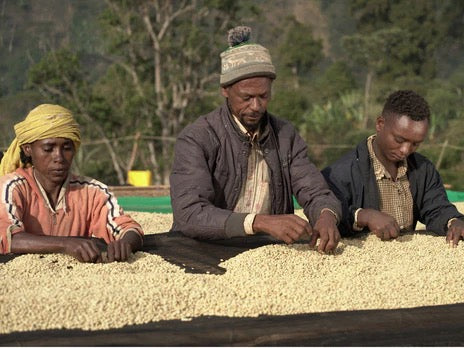
HALO / ETHIOPIA
Haro / Ethiopia
[Flavor profile]
Pomelo, Lychee, Jasmine, Bergamot, Black tea.
It has the fruity flavors of pomelo and lychee, the gorgeous aroma of jasmine and bergamot, and a long aftertaste of black tea.
【 Info 】
Country of Origin: Ethiopia
Location: SNNPR > Gedeo > Gedeb > Halo (Southern Nations, Nationalities, and People's Region > Gedeo > Gedeb > Halo)
Refinery: Halo Washing Station
Producers: 170 small producers from the village of Haro
Variety: Dega, Wolisho
Refining method: Washed
Elevation: 1950 -2200 masl
Harvest season: October to December 2023
This year marks the fifth time we have purchased coffee from Ethiopia since 2020, and as usual, we visited Ethiopia at the end of February to select the purchase lots. This is the first time we have purchased coffee from Halo Washing Station, and we feel that it is an elegant and complex coffee with a high quality.
The flavor changes little by little as you drink it, and behind the fruitiness you can see the sweet aroma of white flowers like jasmine and the lingering aroma of black tea. This is a wonderful coffee that lets you experience the floral flavors of Ethiopia.

I have visited the dry mill of SNAP TRADING, the exporter of Danche and Halo, twice, last year and this year. The process in a dry mill produces a lot of dust and noise, but on both visits the work area was kept very clean, and I got the impression that they are actively investing in sorting equipment. At first glance it looks like a factory, but the sorting process here is an important point that has a big impact on the quality and shelf life of the coffee.
Each section has a manager. As with last year, our tour of the mill was given by Bahar, head of the sorting section. To maintain high quality coffee, it is necessary to consistently manage the process from cultivation to harvesting and refining with high quality. From his enthusiastic explanation of the equipment and processes, we could see that this team is committed to producing a high-quality product.

Haro Washing Station is located in Haro Verity, Gedeo Region. The coffee is made up of cherries from smallholder farmers in the area and processed at Haro Washing Station. Haro is located at 2100 meters above sea level, near Walka Town, Gedeo. Haro is one of the largest coffee producing areas in Gedeo, with a total coffee plantation area of 1240 hectares in the region.
The washing station buys cherries from around 170 small farms in the area, with an average size of 0.5 to 2 hectares and located between 1,925 and 2,110 metres above sea level. The washing station is located close to the farms, so each farmer can transport their cherries within 40 minutes.

Cherries are harvested and sorted by smallholder farmers who, depending on the location of their farm, choose collection points or stations to sell their cherries directly to. Additional sorting also takes place at the refinery as the cherries are brought in.
Once the cherries are brought to the station, they are immediately dumped directly into a hopper connected to a pulping machine (a traditional Agarde disc pulper). The coffee flows from the hopper to the pulper, which removes the skin and pulp. This machine is designed to separate the cherries into high and low quality (1st and 2nd class) grades.

The coffee is then fermented in tanks filled with water for an average of 72 hours, but usually ranges from 48 to 100 hours. The coffee is graded again in a water channel, and the lower quality (low density) cherries float to the top. The low density cherries are removed, and the higher quality beans with higher density are set aside as premium lots.
The parchment (the skins of the coffee beans) are soaked in clean water and then dried on raised beds for approximately 8 to 20 days, in layers of 2 to 8 cm, depending on the climate, the type of table used and the drying stage.



